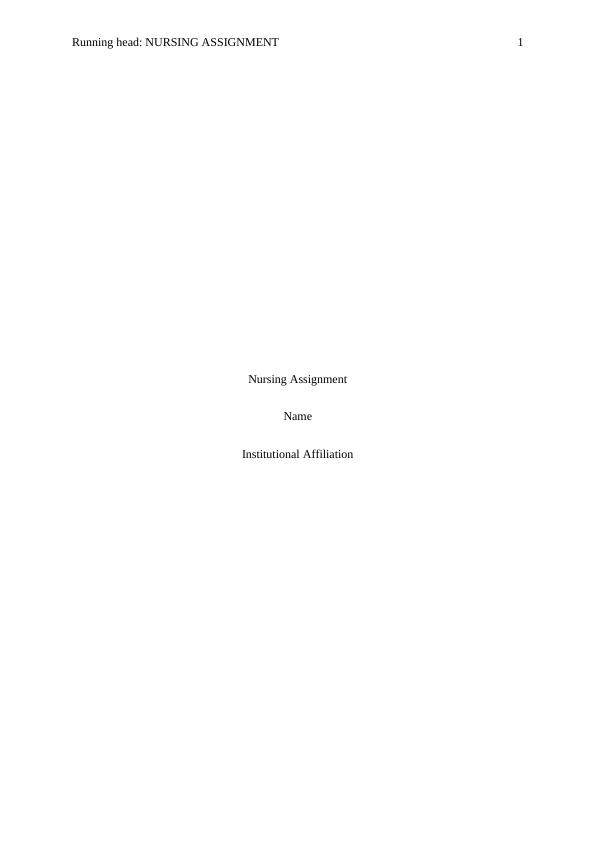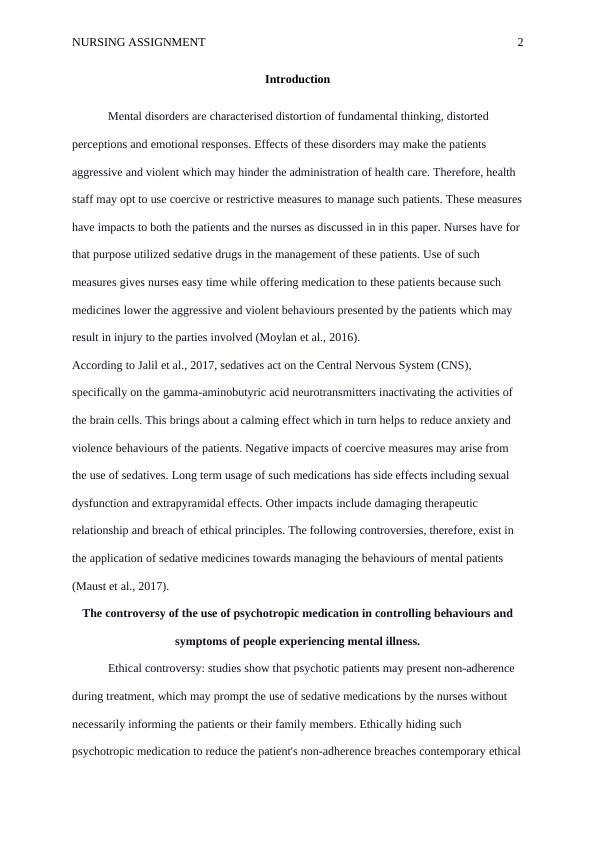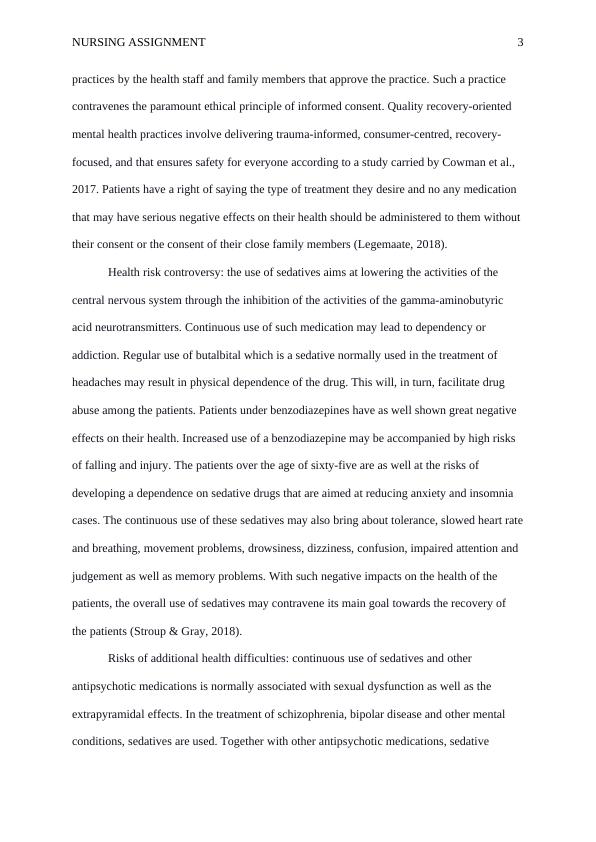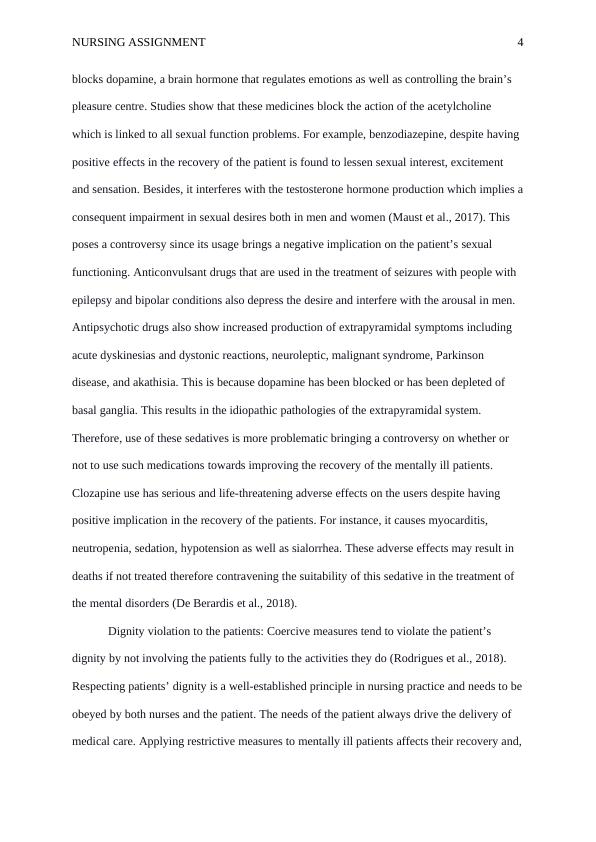THE NURSING ASSIGNMENT
Added on 2022-09-11
11 Pages3153 Words20 Views
Running head: NURSING ASSIGNMENT 1
Nursing Assignment
Name
Institutional Affiliation
Nursing Assignment
Name
Institutional Affiliation

NURSING ASSIGNMENT 2
Introduction
Mental disorders are characterised distortion of fundamental thinking, distorted
perceptions and emotional responses. Effects of these disorders may make the patients
aggressive and violent which may hinder the administration of health care. Therefore, health
staff may opt to use coercive or restrictive measures to manage such patients. These measures
have impacts to both the patients and the nurses as discussed in in this paper. Nurses have for
that purpose utilized sedative drugs in the management of these patients. Use of such
measures gives nurses easy time while offering medication to these patients because such
medicines lower the aggressive and violent behaviours presented by the patients which may
result in injury to the parties involved (Moylan et al., 2016).
According to Jalil et al., 2017, sedatives act on the Central Nervous System (CNS),
specifically on the gamma-aminobutyric acid neurotransmitters inactivating the activities of
the brain cells. This brings about a calming effect which in turn helps to reduce anxiety and
violence behaviours of the patients. Negative impacts of coercive measures may arise from
the use of sedatives. Long term usage of such medications has side effects including sexual
dysfunction and extrapyramidal effects. Other impacts include damaging therapeutic
relationship and breach of ethical principles. The following controversies, therefore, exist in
the application of sedative medicines towards managing the behaviours of mental patients
(Maust et al., 2017).
The controversy of the use of psychotropic medication in controlling behaviours and
symptoms of people experiencing mental illness.
Ethical controversy: studies show that psychotic patients may present non-adherence
during treatment, which may prompt the use of sedative medications by the nurses without
necessarily informing the patients or their family members. Ethically hiding such
psychotropic medication to reduce the patient's non-adherence breaches contemporary ethical
Introduction
Mental disorders are characterised distortion of fundamental thinking, distorted
perceptions and emotional responses. Effects of these disorders may make the patients
aggressive and violent which may hinder the administration of health care. Therefore, health
staff may opt to use coercive or restrictive measures to manage such patients. These measures
have impacts to both the patients and the nurses as discussed in in this paper. Nurses have for
that purpose utilized sedative drugs in the management of these patients. Use of such
measures gives nurses easy time while offering medication to these patients because such
medicines lower the aggressive and violent behaviours presented by the patients which may
result in injury to the parties involved (Moylan et al., 2016).
According to Jalil et al., 2017, sedatives act on the Central Nervous System (CNS),
specifically on the gamma-aminobutyric acid neurotransmitters inactivating the activities of
the brain cells. This brings about a calming effect which in turn helps to reduce anxiety and
violence behaviours of the patients. Negative impacts of coercive measures may arise from
the use of sedatives. Long term usage of such medications has side effects including sexual
dysfunction and extrapyramidal effects. Other impacts include damaging therapeutic
relationship and breach of ethical principles. The following controversies, therefore, exist in
the application of sedative medicines towards managing the behaviours of mental patients
(Maust et al., 2017).
The controversy of the use of psychotropic medication in controlling behaviours and
symptoms of people experiencing mental illness.
Ethical controversy: studies show that psychotic patients may present non-adherence
during treatment, which may prompt the use of sedative medications by the nurses without
necessarily informing the patients or their family members. Ethically hiding such
psychotropic medication to reduce the patient's non-adherence breaches contemporary ethical

NURSING ASSIGNMENT 3
practices by the health staff and family members that approve the practice. Such a practice
contravenes the paramount ethical principle of informed consent. Quality recovery-oriented
mental health practices involve delivering trauma-informed, consumer-centred, recovery-
focused, and that ensures safety for everyone according to a study carried by Cowman et al.,
2017. Patients have a right of saying the type of treatment they desire and no any medication
that may have serious negative effects on their health should be administered to them without
their consent or the consent of their close family members (Legemaate, 2018).
Health risk controversy: the use of sedatives aims at lowering the activities of the
central nervous system through the inhibition of the activities of the gamma-aminobutyric
acid neurotransmitters. Continuous use of such medication may lead to dependency or
addiction. Regular use of butalbital which is a sedative normally used in the treatment of
headaches may result in physical dependence of the drug. This will, in turn, facilitate drug
abuse among the patients. Patients under benzodiazepines have as well shown great negative
effects on their health. Increased use of a benzodiazepine may be accompanied by high risks
of falling and injury. The patients over the age of sixty-five are as well at the risks of
developing a dependence on sedative drugs that are aimed at reducing anxiety and insomnia
cases. The continuous use of these sedatives may also bring about tolerance, slowed heart rate
and breathing, movement problems, drowsiness, dizziness, confusion, impaired attention and
judgement as well as memory problems. With such negative impacts on the health of the
patients, the overall use of sedatives may contravene its main goal towards the recovery of
the patients (Stroup & Gray, 2018).
Risks of additional health difficulties: continuous use of sedatives and other
antipsychotic medications is normally associated with sexual dysfunction as well as the
extrapyramidal effects. In the treatment of schizophrenia, bipolar disease and other mental
conditions, sedatives are used. Together with other antipsychotic medications, sedative
practices by the health staff and family members that approve the practice. Such a practice
contravenes the paramount ethical principle of informed consent. Quality recovery-oriented
mental health practices involve delivering trauma-informed, consumer-centred, recovery-
focused, and that ensures safety for everyone according to a study carried by Cowman et al.,
2017. Patients have a right of saying the type of treatment they desire and no any medication
that may have serious negative effects on their health should be administered to them without
their consent or the consent of their close family members (Legemaate, 2018).
Health risk controversy: the use of sedatives aims at lowering the activities of the
central nervous system through the inhibition of the activities of the gamma-aminobutyric
acid neurotransmitters. Continuous use of such medication may lead to dependency or
addiction. Regular use of butalbital which is a sedative normally used in the treatment of
headaches may result in physical dependence of the drug. This will, in turn, facilitate drug
abuse among the patients. Patients under benzodiazepines have as well shown great negative
effects on their health. Increased use of a benzodiazepine may be accompanied by high risks
of falling and injury. The patients over the age of sixty-five are as well at the risks of
developing a dependence on sedative drugs that are aimed at reducing anxiety and insomnia
cases. The continuous use of these sedatives may also bring about tolerance, slowed heart rate
and breathing, movement problems, drowsiness, dizziness, confusion, impaired attention and
judgement as well as memory problems. With such negative impacts on the health of the
patients, the overall use of sedatives may contravene its main goal towards the recovery of
the patients (Stroup & Gray, 2018).
Risks of additional health difficulties: continuous use of sedatives and other
antipsychotic medications is normally associated with sexual dysfunction as well as the
extrapyramidal effects. In the treatment of schizophrenia, bipolar disease and other mental
conditions, sedatives are used. Together with other antipsychotic medications, sedative

NURSING ASSIGNMENT 4
blocks dopamine, a brain hormone that regulates emotions as well as controlling the brain’s
pleasure centre. Studies show that these medicines block the action of the acetylcholine
which is linked to all sexual function problems. For example, benzodiazepine, despite having
positive effects in the recovery of the patient is found to lessen sexual interest, excitement
and sensation. Besides, it interferes with the testosterone hormone production which implies a
consequent impairment in sexual desires both in men and women (Maust et al., 2017). This
poses a controversy since its usage brings a negative implication on the patient’s sexual
functioning. Anticonvulsant drugs that are used in the treatment of seizures with people with
epilepsy and bipolar conditions also depress the desire and interfere with the arousal in men.
Antipsychotic drugs also show increased production of extrapyramidal symptoms including
acute dyskinesias and dystonic reactions, neuroleptic, malignant syndrome, Parkinson
disease, and akathisia. This is because dopamine has been blocked or has been depleted of
basal ganglia. This results in the idiopathic pathologies of the extrapyramidal system.
Therefore, use of these sedatives is more problematic bringing a controversy on whether or
not to use such medications towards improving the recovery of the mentally ill patients.
Clozapine use has serious and life-threatening adverse effects on the users despite having
positive implication in the recovery of the patients. For instance, it causes myocarditis,
neutropenia, sedation, hypotension as well as sialorrhea. These adverse effects may result in
deaths if not treated therefore contravening the suitability of this sedative in the treatment of
the mental disorders (De Berardis et al., 2018).
Dignity violation to the patients: Coercive measures tend to violate the patient’s
dignity by not involving the patients fully to the activities they do (Rodrigues et al., 2018).
Respecting patients’ dignity is a well-established principle in nursing practice and needs to be
obeyed by both nurses and the patient. The needs of the patient always drive the delivery of
medical care. Applying restrictive measures to mentally ill patients affects their recovery and,
blocks dopamine, a brain hormone that regulates emotions as well as controlling the brain’s
pleasure centre. Studies show that these medicines block the action of the acetylcholine
which is linked to all sexual function problems. For example, benzodiazepine, despite having
positive effects in the recovery of the patient is found to lessen sexual interest, excitement
and sensation. Besides, it interferes with the testosterone hormone production which implies a
consequent impairment in sexual desires both in men and women (Maust et al., 2017). This
poses a controversy since its usage brings a negative implication on the patient’s sexual
functioning. Anticonvulsant drugs that are used in the treatment of seizures with people with
epilepsy and bipolar conditions also depress the desire and interfere with the arousal in men.
Antipsychotic drugs also show increased production of extrapyramidal symptoms including
acute dyskinesias and dystonic reactions, neuroleptic, malignant syndrome, Parkinson
disease, and akathisia. This is because dopamine has been blocked or has been depleted of
basal ganglia. This results in the idiopathic pathologies of the extrapyramidal system.
Therefore, use of these sedatives is more problematic bringing a controversy on whether or
not to use such medications towards improving the recovery of the mentally ill patients.
Clozapine use has serious and life-threatening adverse effects on the users despite having
positive implication in the recovery of the patients. For instance, it causes myocarditis,
neutropenia, sedation, hypotension as well as sialorrhea. These adverse effects may result in
deaths if not treated therefore contravening the suitability of this sedative in the treatment of
the mental disorders (De Berardis et al., 2018).
Dignity violation to the patients: Coercive measures tend to violate the patient’s
dignity by not involving the patients fully to the activities they do (Rodrigues et al., 2018).
Respecting patients’ dignity is a well-established principle in nursing practice and needs to be
obeyed by both nurses and the patient. The needs of the patient always drive the delivery of
medical care. Applying restrictive measures to mentally ill patients affects their recovery and,

End of preview
Want to access all the pages? Upload your documents or become a member.
Related Documents
MH2 Mental Health Document Analysislg...
|13
|3726
|34
Bachelor of Nursing - Sedative Medicationlg...
|11
|2925
|13
The treatment of mental disorderslg...
|11
|3197
|22
About psychiatric medicationlg...
|12
|3461
|8
Mental Health Medications And Treatmentlg...
|10
|3224
|13
journal of the European Collegelg...
|12
|3287
|17
